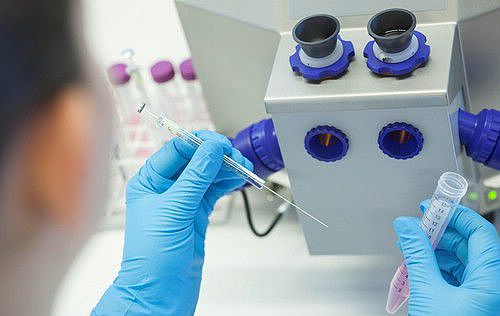
AG Molekulare Psychotraumatologie

Projektleitung und Team
Projektleitung
Prof. Dr. Iris-Tatjana Kolassa
Team
Dr. Matthias Mack
Dr. Nehir Mavioglu
Dr. Melissa Hitzler
Ellen Bisle
Hannah Keppler
Ansprechpartner
✉ Prof. Dr. Iris-Tatjana Kolassa
Forschungsthemen
- Genetik und Epigenetik von Missbrauchs-, Misshandlungs- & Vernachlässigungserfahrungen in der Kindheit
- Psychoneuroimmunologische Konsequenzen bei Stress und Trauma
- Psychologische und biologische Auswirkungen von Missbrauchs-, Misshandlungs- & Vernachlässigungserfahrungen in der Kindheit
- Transdisziplinäre Traumaforschung
- Ernährung und psychische Gesundheit
Medienbeiträge
- Beitrag Regio TV (2018)
- Beitrag SWR Aktuell (2018)
- NDR Radio-Interview
Projekte
- Psychoneuroimmunologische und bioenergetische Korrelate der Depression
- BMBF-Projekt: Meine Kindheit – Deine Kindheit
- Ätiologie, Symptomatologie und Therapie der Posttraumatischen Belastungsstörung bei Überlebenden des Bürgerkriegs in Uganda
- ENHANCE - Biomolekulare Effekte traumafokussierter Psychotherapie bei Patienten mit Missbrauchs-, Misshandlungs- und Vernachlässigungserfahrungen in der Kindheit und Jugend
- MitO2Health
Drittmittel
- 01/2019-12/2024 BMBF-Projekt: Enhancing understanding and treatment of post-traumatic stress disorder related to child maltreatment (ENHANCE; Koordinator: F. Leichsenring), subproject I.-T. Kolassa: Preventing premature morbidity and mortality after childhood maltreatment: Reversing the molecular toxicity of traumatic stress through trauma-focused therapies.
Ausgewählte Publikationen
- Boeck, C., Gumpp, A.M., Calzia, E., Radermacher, P., Waller, C., Karabatsiakis, A., Kolassa, I.-T. (2018). The association between cortisol, oxytocin and immune cell mitochondrial oxygen consumption in postpartum women with childhood maltreatment. Psychoneuroendocrinology, 96, 69-77. [abstract]
- Boeck, C., Salinas-Manrique, J., Calzia, E., Radermacher, P., von Arnim, C. A. F., Detlef, D., Kolassa, I.-T., Karabatsiakis, A. (2018). Targeting the association between telomere length and immune-cellular bioenergetics in female patients with major depressive disorder. Scientific Reports, e9419. [pdf]
- Geiger, M. L., Boeck, C., Koenig, A. M., Schury, K., Waller, C., Kolassa, S., Karabatsiakis, A., Kolassa, I.-T. (2018). Investigating the effects of child maltreatment experiences on inflammation: The influence of cortisol and DHEA on cytokine secretion ex vivo. Mental Health and Prevention. Early online.
- Koenig, A., Alexandra M., Ramo-Fernández, L., Boeck, C., Umlauft, M., Pauly, M., Binder, E.B., Kirschbaum, C., Gündel, H., Karabatsiakis, A., Kolassa, I.-T. (2018). Intergenerational gene × environment interaction of FKBP5 and childhood maltreatment on hair steroids. Psychoneuroendocrinology, 92, 103-112. [pdf]
- Koenig, A. M., Reister, F., Gao, W., Umlauft, M., Schury, K., Kirschbaum, K., Karabatsiakis, A., Kolassa, I.-T. (2018). Altered hair endocannabinoid levels in mothers with childhood maltreatment and their newborns. Biological Psychology, 35, 93-101. [abstract]
- Boeck, C., Pfister, S., Bürkle, A., Vanhooren, V., Libert, C., Salinas-Manrique, J., Dietrich, D. E., Kolassa, I.-T., Karabatsiakis, A. (2018). Alterations of the serum N-glycan profile in female patients with Major Depressive Disorder. Journal of Affective Disorders, 234, 139-147. [abstract]
- Koenig, A.M., Karabatsiakis, A., Stoll, T., Wilker, S., Hennessy, T., Hill, M. M., & Kolassa, I.-T. (2018). Serum profile changes in individuals with a history of childhood maltreatment: a combined metabolite and lipid fingerprinting study. Scientific Reports, 8:e3468. [pdf]
- Boeck, C., Krause, S., Karabatsiakis, A., Schury, K., Gündel, H., Waller, C., Kolassa, I.-T. (2017). History of child maltreatment and telomere length in immune cell subsets: Associations with stress and attachment-related hormones. Development and Psychopathology. 30(2), 539-551. [pdf]
- Boeck, C., Koenig, A. M., Schury, K., Geiger, M. L., Karabatsiakis, A., Wilker, S., Waller, C., Gündel, H., Fegert, J. M., Calzia, E., Kolassa, I.-T. (2016). Inflammation in adult women with a history of child maltreatment: the involvement of mitochondrial alterations and oxidative stress. Mitochondrion, 30, 197-207. [pdf]
- Wilker, S., Pfeiffer, A., Elbert, T. Ovuga, E., Karabatsiakis, A., Krumbholz, A., Thieme, D., Schelling, G., Kolassa, I.-T. (2016). Endocannabinoid Concentrations in Hair are Associated with PTSD Symptom Severity. Psychoneuroendocrinology, 67:198-206. [pdf]
- Karabatsiakis, A., Hamuni, G., Wilker, S., Kolassa, S., Renu, D., Kadereit, S., Schauer, M., Hennessy, T. & Kolassa, I.-T. (2015). Metabolite profiling in posttraumatic stress disorder. Journal of Molecular Psychiatry, 3(1):e2. [pdf]
- Karabatsiakis, A., Kolassa, I.-T., Kolassa, S., Rudolph, K.-L., Dietrich, D. E. (2014). Telomere shortening in leukocyte subpopulations in depression. BMC Psychiatry, 14(1): e192. [pdf]
- Wilker, S., Elbert, T., Papassotiropoulos, A., de Quervain, D. J.-F., Kolassa, I.-T. (2014). Response to: further support for an association between the memory-related gene WWC1 and posttraumatic stress disorder: results from the Detroit Neighborhood Health Study. Biological Psychiatry, 76(11), 27-28.
- Karabatsiakis, A., Böck, C., Manrique, J.S., Kolassa, S., Calzia, E., Dietrich, D.E., Kolassa, I.-T. (2014). Mitochondrial respiration in peripheral blood mononuclear cells correlates with depressive subsymptoms and severity of major depression. Translational Psychiatry, 4, e397. [pdf]
- Morath, J., Moreno-Villanueva, M., Hamuni, G., Kolassa, S., Ruf, M., Schauer, M., Bürkle, A., Elbert, T., Kolassa, I.-T. (2014). Effects of psychotherapy on DNA strand break accumulation originating from traumatic stress. Psychotherapy and Psychosomatics, 83(5), 289-297. [pdf]
